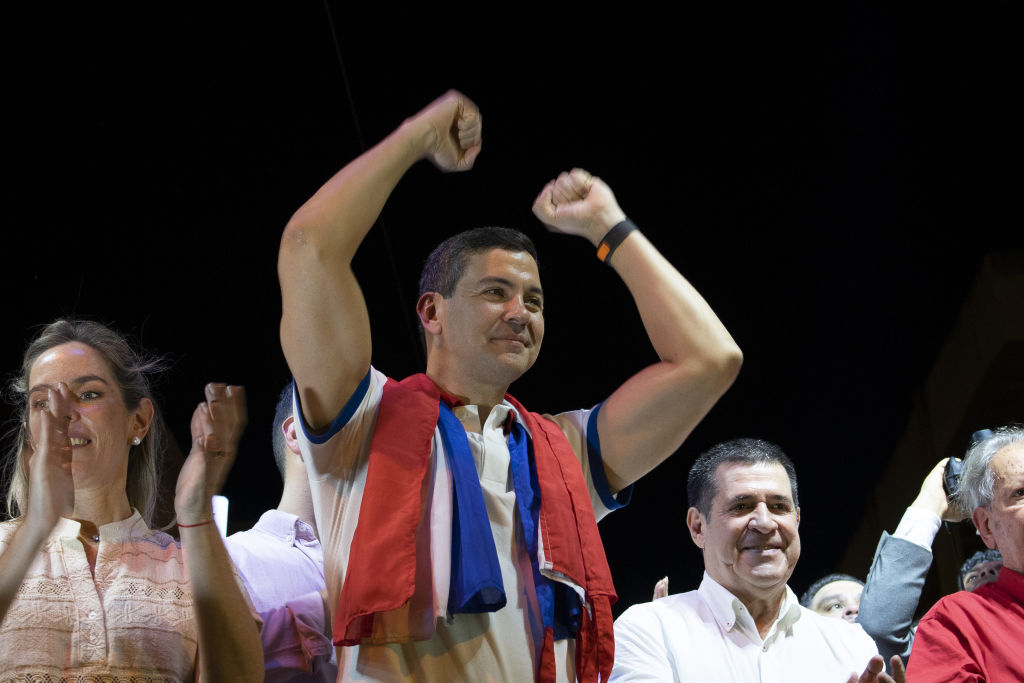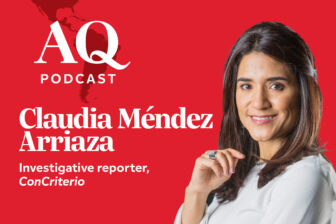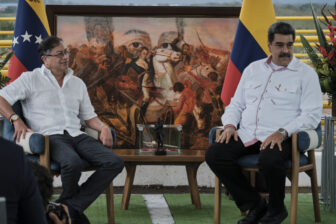Santiago Peña’s surprisingly easy victory in Paraguay’s presidential elections Sunday ensured another five-year term for South America’s longest-governing political party—but he will face numerous challenges including relations with Taiwan, divisions in his ranks and U.S. scrutiny over alleged corruption in the party.
The 44-year old former finance minister received 42% of the vote despite U.S. sanctions and corruption accusations against his mentor, former President Horacio Cartes. Paraguayans also gave the Colorado Party a majority in the 45-member Senate, 80-member lower house. But winning the presidency could turn out to be the easiest hurdle for Peña. He will face a country that is unconvinced of his leadership—absenteeism was close to 40%—and will have to work with a highly fractured Congress, including divisions within his own party.
José Carlos Rodríguez, a political scientist with the Latin American Council of Social Sciences, said Peña starts out with a serious image problem within the Colorado Party itself. “The problem is not Santiago Peña as a person or even a politician. The problem is that he is seen as under the thumb of (former President) Horacio Cartes, with no political capital of his own in the party or his future the government,” said Rodríguez. Peña was Cartes’ finance minister when he was president from 2013 to 2018.
Peña will have to navigate carefully, with any misstep holding serious consequences at home and abroad. The Colorado Party’s congressional delegation is divided, with one side staunchly behind Cartes, while a group allied with sitting President Mario Abdo wants a generational change. Abdo, in an interview prior to the vote, said the Colorado Party was in crisis.
Cartes, who was elected chairman of the Colorado Party in December, attempted to change the constitution in 2017 to allow for his own re-election, and is now under the microscope of the U.S. government for alleged money laundering and links to terrorism. He denies wrongdoing. The U.S. State Department last July designated Cartes as a significantly corrupt individual. This was followed in January by the U.S. Treasury, which went after Cartes’ businesses, including his flagship tobacco factory allegedly used to launder money and linking his operation to Hezbollah. Alfredo Boccia, medical doctor and political commentator for the daily Ultima Hora, said the State Department’s sanctions were not taken too seriously by the Colorado Party, which is why Cartes was elected party chairman in December. He said that Treasury’s sanctions, however, “blew a hole in Cartes cash pipeline” and opened the possibility for extradition to the United States, which would be a game-changer for the party and Peña. “Cartes is terrified of the possibility of extradition, which would be the third step. I think we will see movement soon to try and get this option off the table,” he said.
The elections brought into focus two other international issues that could also be highly contentious if the opposition pursues them in Congress. Later this year Paraguay and neighboring Brazil will renegotiate the treaty governing Itaipú, the world’s second largest hydroelectric plant with a capacity to generate 14,000MW of electricity. Paraguay sells the bulk of its share of Itaipú’s energy generation to Brazil, the country’s second export earner after soybeans. Peña steered clear of the issue during the campaign, saying only that he was confident that Brazil would negotiate fairly. Decisions about Itaipú will be not only about rates received for power, but also about how the energy is used, and could lead to the largest foreign investments in the country’s history. Two projects, one headed by Canada’s NeoGreen Hydrogen and another by U.K.-based Atome Energy, want to use Itaipú to produce green hydrogen. They would create a value chain for resources that currently does not exist in Paraguay and new revenue streams.
Also in the works is the 1.8-million ton/year pulp and paper project, Paracel, that has German, Swedish and local investors. Total investment could be as high as $3 billion, making it the largest private investment in Paraguay. Veronica Serafini, an economist at Cadep, an economic research institute, said economic diversification is critical for the country’s economic performance going forward. “The low multiplying effect and volatility of our gross domestic product is the result of a model highly concentrated on few goods with little value added and few export markets,” she said. The International Monetary Fund (IMF) forecasts 4.5% economic growth this year for Paraguay, following a decrease of 0.3% in GDP last year.
Peña defeated opposition candidate Efraín Alegre, who campaigned on switching diplomatic ties from Taiwan to China to boost exports and investment. Paraguay is the last country in South America that has diplomatic relations with Taiwan. Only two other countries in the mainland Americas, Guatemala and Belize, have diplomatic links with Taiwan. Alegre said ditching Taiwan for China would create new markets for the country. Paraguay exports around $3.8 billion in soy products, mainly to Argentina, $1.6 billion in power to Brazil and $1.5 billion in beef, mostly to Chile, and sells little else.
Now, President-elect Peña will have to make a case that Taiwan is a suitable partner, but there are grumblings even within the Colorado Party. Outgoing President Abdo has called for Taiwan to invest up to $1 billion in order for the partnership to remain strong. In early April he inaugurated a Taiwan-financed road project for $24 million. Rodríguez said that while the China-Taiwan debate did not weigh heavily on voters, investment in public works, including highways, requires financing, and it is not going to come from Taiwan.
“At the end of the day, it is going to be an economic choice, not a diplomatic decision,” he said.
—
Chauvin is a journalist based in Uruguay covering the Southern Cone.







